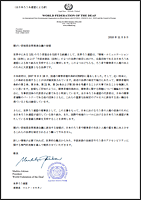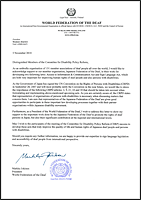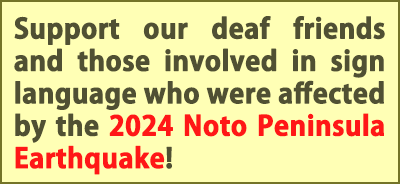Today marks the first year since the massive earthquake and tsunami that hit Japan on March 11, 2011. The entire world was shaken by the news of this devastating natural disaster.
The earthquake was so intense that we could barely stand on our feet and the enormous tsunami that followed washed away towns along the northeastern coast, destroying everything and killing thousands of people. Even worse, it triggered the world’s worst nuclear crisis in history.
At that moment, we could do nothing but just stare at televisions feeling helpless and vulnerable to the power of Mother Nature. However, we knew that immediate action was needed to help Deaf survivors and announced a meeting with ZENTSUKEN and Japanese Association of Sign Language Interpreters (JASLI) to organize Central Headquarters for Disaster Relief for Deaf People in the Great East Japan Earthquake to respond to this disaster.
Thanks to all the supporters, we were able to provide relief goods, to dispatch sign language interpreters as well as to host events to encourage survivors and to offer emotional support service in the affected area.
We raised more than 60 million yen (USD 750,000) to support Deaf survivors through the generosity of friends from all over the world. I would like to take this opportunity to thank you for your contribution and encouragement.
Over the course of the year, it seems things are gradually settling down. However, many people still are going through a hard, tough time, some lost their job, some still live in temporary homes and some suffer from trauma. The journey to recovery has just begun and we are committed to support them until they get back their normal life.
As for relief funds, the fundraising target amount has not been achieved and we do not have enough funds to distribute necessary money for all the Deaf survivors. As the deadline for accepting donations has been extended, we ask your continuous support for our relief efforts.
We cannot recover everything which was lost by this tragedy, but we will stand by the people from the disaster-stricken areas and continue to support them until they recover their physical and emotional health and get back their normal lives with a safe place to live and a decent job before the earthquake and tsunami.
Although it is expected that recovery will take many years, we will dedicate ourselves to help them as long as we are needed. Your continued support and contribution will be greatly appreciated. Thank you.
March 11, 2012
Fujisaburo Ishino
Chief, Great East Japan Earthquake Central Headquarters




